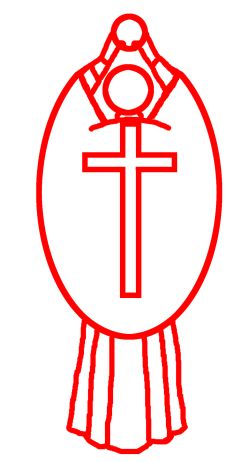
4 minute read
Spiritual health
We must keep our eyes on the prize, as James Preece explains
One of my children is studying GCSE History this year and as a result she has taken to writing snippets of information on little pieces of paper and sticking them around the house. Recently I was minding my own business, getting a cup of tea when I found the following nugget hanging on my fridge door: “The Church encouraged people to believe disease was a punishment from God rather than having a natural cause. This prevented people from trying to find cures for disease - if disease was a punishment from God, all you could do was pray and repent.”
Is this true? Maybe some historians can write in and let me know, but it seems to me a bit of an oversimplification. The mean old Catholic Church, all fire and brimstone and punishments from God. Holding us back and stopping us from discovering penicillin.
One wonders what Hildegard von Bingen would have to say on the subject. Her book Causae et Curae written sometime in the 1150s described the practical application of tinctures and herbs in the treatment of various ailments, information she had picked up working in the infirmary at her monastery. Monastery herb gardens across Europe grew specialist plants as cures for all manner of diseases which seems a strange thing to do if, “all you can do is pray and repent”.
In 1215 when the Fourth Lateran Council prohibited clergy from being involved in the shedding of blood, they went out of their way to say that, “nor may a subdeacon, deacon or priest practise the art of surgery, which involves cauterising and making incisions”, which suggests, that until this time, some of the clergy were perhaps doubling up as surgeons. Note that Lateran IV didn’t prohibit surgery, only clergy surgery. I wonder if this prohibition remains and if so, what do our Priests do if they ever get a really bad splinter?
Theodoric Borgognoni, a Dominican Friar and Bishop of the mid-13th Century somehow got around that particular restriction and practised surgery alongside his episcopal and religious duties, even becoming Physician to Pope Innocent IV. In Cyrurgia (literally “surgery”) his fourvolume treatise covering all aspects of surgical work, he recommended soaking bandages in wine as a form of disinfectant and instructions for using opium, mandrake, hemlock, mulberry juice, ivy and other substances as anaesthetics. Do not try this at home.
I could go on, but the point is that this image of the medieval world as a place where the Church, “prevented people from trying to find cures for disease” doesn’t entirely ring true, once we begin to dig a little. The monks who grew herbs for healing were clearly at ease with the idea of natural remedies, but at the same time, they knew that physical healing isn’t the whole story.
Medieval people knew their Scripture and they would have read many tales of Our Blessed Lord healing disease and sickness. In each case physical healing is accompanied by spiritual healing. For example, in Matthew 9 Jesus first tells a paralysed man, “your sins are forgiven” and only when some scribes mutter to themselves does Our Lord ask: “Which is easier: to say, ‘Your sins are forgiven,’ or to say, ‘Stand up and walk’?” Jesus tells us the true reason for his healing miracle: “So that you may know that the Son of Man has authority on earth to forgive sins.”
This is why, although the Church most certainly doesn’t prohibit people from trying to find cures for disease, she must also remind us that spiritual health has to come first.
The Catechism of the Council of Trent sums it up like this: “It is God who has given medicines to man to heal his corporal infirmities; and hence these words of Ecclesiasticus: The most High hath created medicines out of the earth, and a wise man will not abhor them. He, therefore, who has pledged his fidelity to Jesus Christ, does not place his principal hope of recovery in such remedies; he places it in God, the author of these medicines.”
Faith in God doesn’t mean closing the door on natural reason or refusing the use of our God given talents - but it does mean we have to keep our eyes on the prize and ultimately, the goal is not to prolong our lives on earth but to find eternal life in Heaven.










